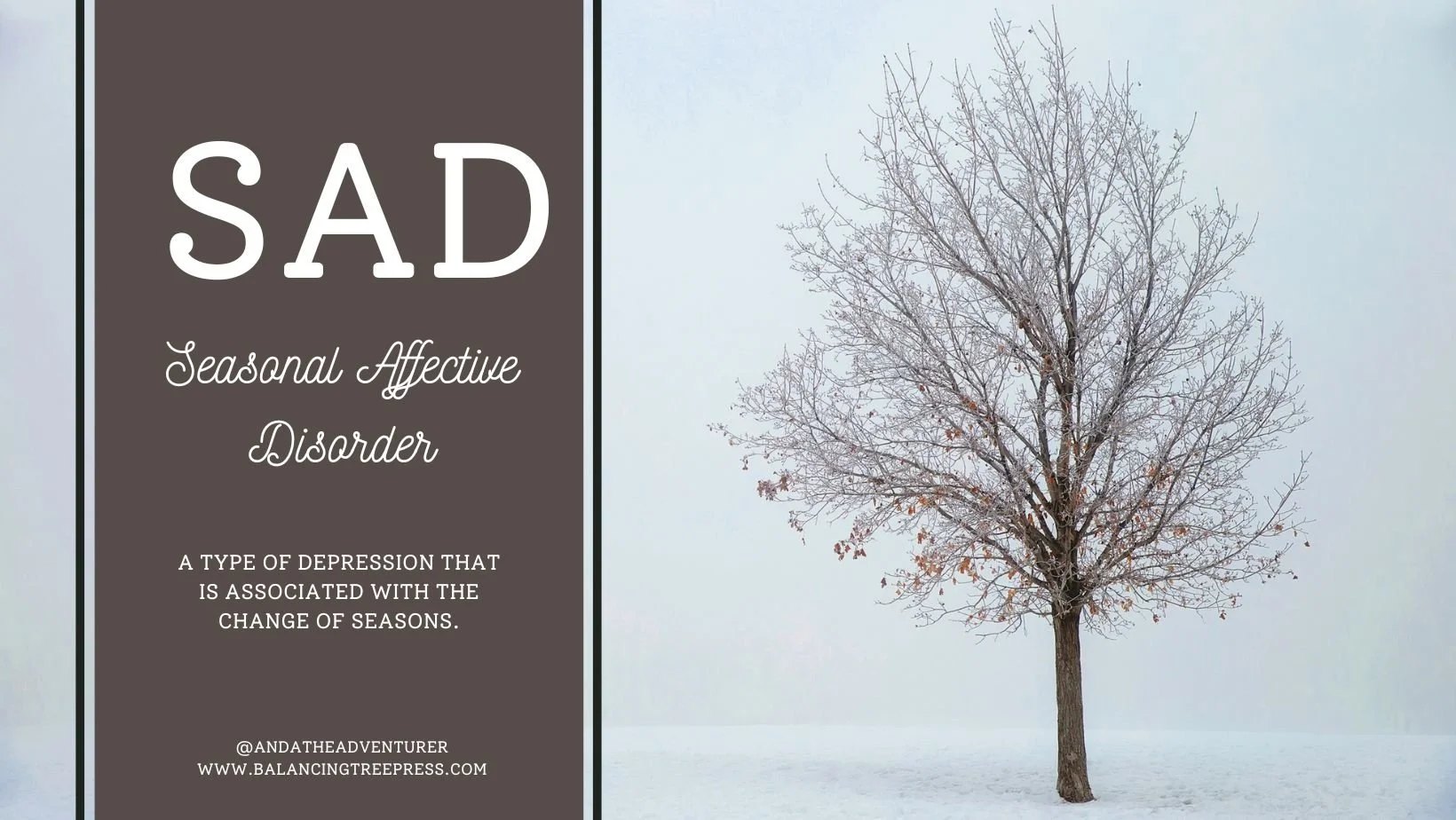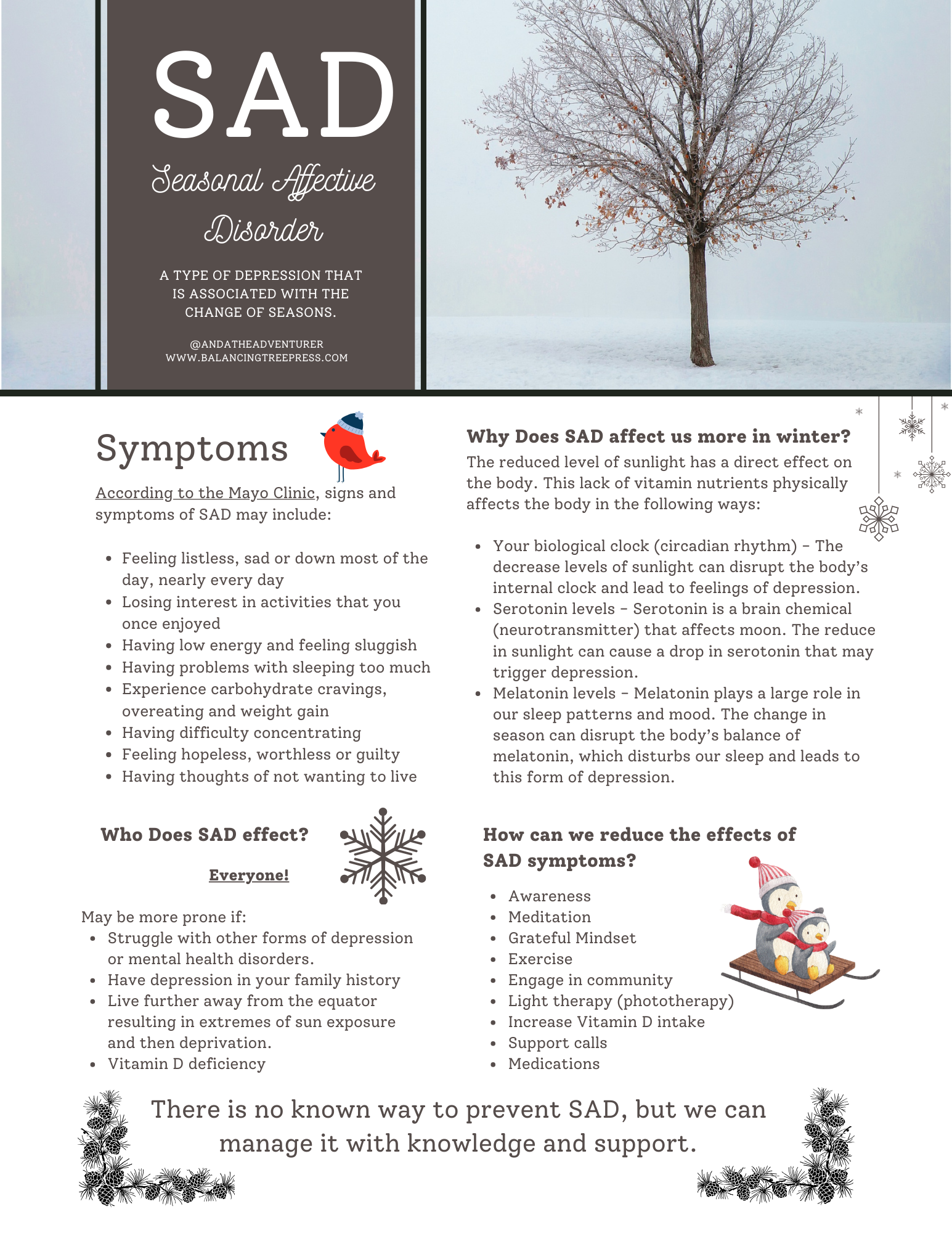Seasonal Affective Disorder (SAD)
What is SAD?
Seasonal affective disorder, or SAD, is a type of depression that triggers based on the change of seasons. Typically it starts in fall and continues into the winter months. It may also start in spring and continue through summer. You may notice a drop in energy levels and feeling more moody for seemingly no reason.
What are the symptoms?
According to the Mayo Clinic, signs and symptoms of SAD may include:
Feeling listless, sad or down most of the day, nearly every day
Losing interest in activities you once enjoyed
Having low energy and feeling sluggish
Having problems with sleeping too much
Experience carbohydrate cravings, overeating and weight gain
Having difficulty concentrating
Feeling hopeless, worthless or guilty
Having thoughts of not wanting to live
Why does it affect us in winter?
The reduced level of sunlight has a direct effect on the body. This lack of vitamin nutrients physically affects the body in the following ways:
Your biological clock (circadian rhythm) - The decrease levels of sunlight can disrupt the body’s internal clock and lead to feelings of depression.
Serotonin levels - Serotonin is a brain chemical (neurotransmitter) that affects moon. The reduce in sunlight can cause a drop in serotonin that may trigger depression.
Melatonin levels - Melatonin plays a large role in our sleep patterns and mood. The change in season can disrupt the body’s balance of melatonin disrupting sleep and leading to depression.
Winter onset of SAD, also known as “winter depression” may include symptoms of
Oversleeping
Appetite changes, especially a craving of high carbohydrate foods
Weight gain
Tiredness and low energy
Not all SAD happens in the winter. The transition between spring into summer can also trigger these same feelings. This summer depression often manifests a little differently.
Summer onset symptoms may also include:
Trouble sleeping (insomnia)
Poor appetite
Weight loss
Agitation or anxiety
Increased irritability
Who does SAD affect?
Everyone! At least, it has the potential to affect anyone, even if it doesn’t occur every year.
People who already struggle with depression or have other diagnosed disorders, such as bipolar disorder, have an increase risk of being affected by SAD.
Those that have a family history of others with SAD or depression, are more likely to be affected.
If you live further away from the equator, you may be more affected by SAD. The decreased sunlight during the winter and then increased sunlight in the summer can trigger these seasonal symptoms.
Vitamin D deficiency can also lead to SAD. Vitamin D is produced in the skin when it’s exposed to sunlight, a lack of sunlight may result in lower serotonin levels that lead to depression.
What can we do to alleviate SAD?
Awareness and Meditation - Your mind is an amazing thing. Becoming aware of how the seasons affect you gives you power to do something about it. Meditation is an excellent way to give yourself space to sort through your feelings about the season and consider ways to change your daily habits that increase your mood.
Exercise - While it will not help on its own, exercise will help increase your neurotransmitters that increase mood and help regulate your nervous system. Exercise also keeps your body moving, which will help the effects of weight gain and increase your energy levels.
Light therapy (phototherapy) - Adding UV light to your house can increase the Vitamin D produced in your skin, which will help balance your serotonin levels.
Take Vitamin D - Vitamin D is produced in the skin when it is exposed to sunlight. When sunlight is limited, there are other ways to receive this vital vitamin that increases our serotonin levels. Try vitamin D rich foods like fish (oil-rich salmon, mackerel, and sardines), eggs (especially the yokes), red meat, and cheese. Also, certain mushrooms contain vitamin D2 and some commercially sold ones contain a concentrated amount due to the intentional exposure to high amounts of ultraviolet light.
Medications - Anti-depressants are sometime necessary to regulate the neurotransmitters of your body. Do not take medications lightly, however, they can make an incredible difference concerning depression and mood. Talk with your doctor to find out if medication is the right decision for you.
Is it worth it to see a doctor?
While normal to feel down some days, if the feeling persists, it may be worth it to see a doctor because there is no reason to suffer when there may be other solutions.
As with any type of depression, it can get worse if not treated. Take the signs and symptoms of SAD seriously. Some complications that can come from SAD include:
Social withdrawal
Issues focusing which can lead to school or work problems
Substance abuse
Other mental health disorders such as anxiety or eating disorders
Suicidal thoughts or behaviors
Especially if you sleep patterns and appetite are effected, there is potential for your symptoms to get worse before they get better. Turning to alcohol or cannabis is another, not so healthy response to these feelings. If you feel hopeless or think about suicide, please reach out to someone! It could be a doctor, a friend, or a hotline.
Medications are a dividing subject, however, there is a place for them. Your doctor can go over options that are pharmaceutical as well as lifestyle changes that could benefit you.
Do you feel SAD? You are not alone!
There is no known way to prevent SAD, however, taking steps to manage it can make all the difference. Don’t suffer through the seasonal funk every year feeling like you have to tough it out on your own. Take steps to connect with others for support and start treatment before your symptoms get bad. Awareness can increase your mood and motivation to feel steady and confident all year long.

